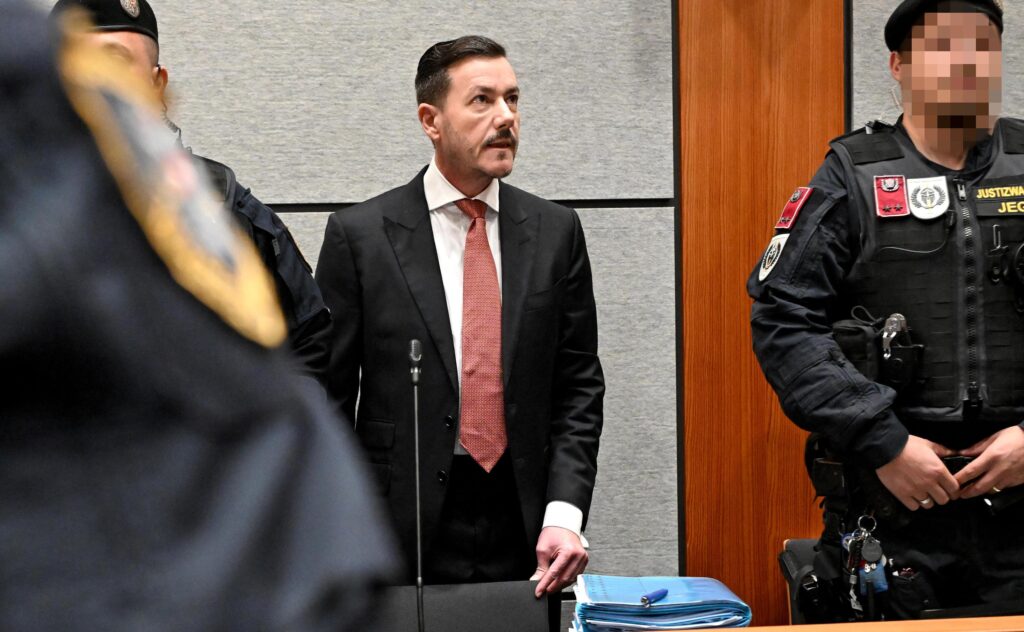
The fallen former real estate tycoon and Signa founder René Benko pleaded not guilty Tuesday at the Innsbruck Regional Court in his trial on charges of fraudulent bankruptcy. Beyond that, he refused to answer questions, instead attacking the prosecution and accusing it of “cynicism.” The hearing was adjourned Tuesday because the questioning of a proposed witness could not take place. The trial will continue Wednesday.
At the start of his examination before Judge Andrea Wegscheider, Benko referred to a written statement submitted the previous week. In it, he and his defense lawyers had “worked everything out meticulously and in detail.” Although he declined to answer further questions, he remarked that the statements made by the Economic and Corruption Prosecutor’s Office (WKStA) were “the height of cynicism.” The “allegations,” he said, were simply false. The house on Innsbruck’s Hungerburg, he insisted, was “provably habitable.” His attorney, Norbert Wess, requested that a witness be called Wednesday to support these claims.
Benko is accused of having, as a sole proprietor, obstructed or diminished the satisfaction of creditor claims during his insolvency by diverting and concealing assets. He allegedly transferred these to companies, private foundations, and his mother—all beginning in autumn 2023, when bankruptcy proceedings were already foreseeable and he was experiencing payment difficulties, according to the WKStA indictment.
Prosecutor Versus Defense
In her opening statement, the prosecutor described how Benko allegedly diverted available funds instead of using them to pay his creditors. Benko himself had the “unusual idea,” she said, of paying €360,000 in advance rent and operating costs for four years in October and November 2023 for a “run-down and uninhabitable house” on Innsbruck’s Hungerburg. He had done this through RB Immobilien GmbH, a subsidiary of the Laura Private Foundation. The 48-year-old—who repeatedly shook his head slightly during the prosecutor’s remarks—wanted to “secure a residence for his family in the long term,” the prosecutor said, adding that he “already knew he would soon be insolvent,” as bankruptcy was already imminent at the time.
WKStA: “What Doesn’t Fit, Is Made To Fit”
The second accusation, the prosecutor said, amounted to a “gift returned as a gift.” Benko allegedly withdrew €1.5 million from the Ingbe Foundation at the end of November 2023 through his mother—since he was not a direct beneficiary. He reportedly used the funds for “various personal expenses, such as furniture and interior design,” while withholding €300,000 from his creditors and transferring the money back to his mother.
For the prosecutor, Benko acted as someone unwilling to give up his “luxurious lifestyle” despite bankruptcy. Overall, she said, he behaved according to the motto “What doesn’t fit, is made to fit.” She cited “retroactive gift agreements” and chat messages with his sister, which she said proved Benko directed the foundations’ affairs. Benko’s sister, mother, and wife exercised their legal right not to appear as witnesses in court.
Defense Attorney Wess: “I Don’t Understand The Indictment”
Benko’s Vienna-based defense attorney, Norbert Wess, strongly disagreed with the prosecution’s opening statement. He pleaded not guilty, saying: “I was very curious and eager to hear the indictment. And I must honestly say: I don’t understand it legally. It is wrong both in its facts and its legal assessment. It misses the main points entirely,” the star lawyer declared in his roughly 30-minute statement.
He said it was “completely off base” for the prosecutor to claim that Benko had secured a tenancy right through the rent prepayment: “You secure a tenancy through a lease agreement.” Furthermore, there was a “repayment claim” for the €360,000 paid: “That was advantageous for the landlord.” Therefore, he said, the money would also have been available to the insolvency administrator.
It was absurd, Wess argued, to accuse Benko of intending to harm his creditors. The money used for the advance payment came from a loan to the Tyrolean entrepreneur. “It was not money that Benko owned beforehand—it had value and countervalue,” he said.
He also rejected the claim that the house on the Hungerburg was uninhabitable due to a landslide and water damage, calling it “objectively false.” A later inspection with the insolvency administrator showed that “the beds were already set up and all the furniture was in place.” The water damage occurred only in the second half of 2024.
The reason Benko and his family did not move in immediately, Wess said, was due to intense media coverage and the resulting “irritations,” which repeatedly delayed the move. Renovations also continued in the first few weeks.
“He Fought For His Life’s Work”
“At that time, Benko was fighting for his life’s work, day and night,” the lawyer recalled. “Compared to him, I’m lazy. What he did was not criminal—it was his right.”
The €1.5 million “loan” from the Laura Foundation, facilitated by Benko’s mother, was intended to allow the son to “make payments to restructuring advisers” and cover ongoing expenses, Wess said.
Wess explained that the €300,000 surplus had been refunded; in December, the mother transferred another €1.2 million to Benko. That money, he said, was needed to provide a guarantee in the self-managed restructuring proceedings for Signa. Ultimately, the restructuring failed, and the Signa companies went bankrupt. “The €300,000 is air,” the attorney argued, “if you look at it economically.”
The trial began Tuesday morning amid massive media attention. Around 70 journalists from Austria and abroad were present in the large jury courtroom as Benko—visibly thinner—appeared under a barrage of camera flashes. The hearing was scheduled for two days, with a verdict expected Wednesday evening.

